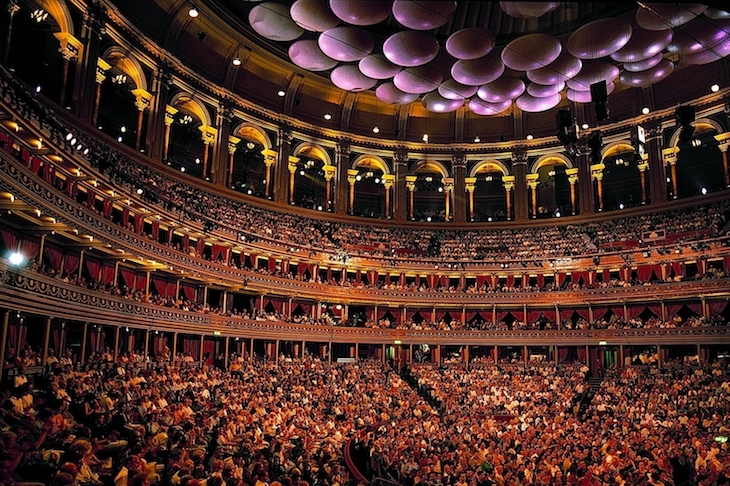They say the first step towards recovery is admitting that you have a problem. So I’m staging an intervention and asking the BBC Proms to admit what they’ve known for some time: they have a big problem when it comes to early music. How to perform it, where to perform it, even who should perform it — these are all questions that, year after year, remain unsatisfactorily, inconsistently or superficially answered, and there’s little in this year’s programming to suggest that 2017 will be any different.
Up until now the festival’s conversation about early music has been dominated by the red-herring question of venue. When the readers of Time Out magazine voted the Royal Albert Hall one of the 20 best music venues in London I’ll venture it wasn’t performances of Palestrina or Pergolesi that they had in mind. The Proms have tacitly acknowledged the difficulty of this acoustic nightmare of a venue in recent years, exiling most of the early music concerts to an increasing number of satellite venues — initially just Cadogan Hall, but now with the new ‘Proms at…’ strand to churches, car parks and all other kinds of spaces.
This is good news — up to a point. The whole point of the Proms is its open-armed, come-one-come-all attitude; the accessibility of tickets, both in terms of price and number, is absolutely central to this. When you swap the RAH (capacity over 5,000 before you open the Arena to Prommers) for even Cadogan Hall, let alone the tiny Sam Wanamaker Playhouse or Wilton’s Music Hall, you lose your casual ticket buyers, your first-timers, tourists — all those for whom an unexpected early music encounter might be most telling. The success of the exceptions — Alina Ibragimova and Yo-Yo Ma’s solo Bach performances in 2015 — only emphasises this.
So if changing the venue isn’t the solution, what is? I think the answer is twofold. The first part is to do with repertoire; we know certain pieces, certain composers, lend themselves better to this space, so why fight it? Pygmalion’s performance of the Monteverdi Vespers proved again this year what we already knew from John Eliot Gardiner’s superb, spatialised staging in 2010 — that this is a piece whose musical scope and drama just works in this building. The same goes for solo Bach, Handel’s larger-scale oratorios and a cappella renaissance polyphony, while out goes medium-sized baroque and almost anything with a chamber organ.
The second part is tougher. We’ve fought so hard to establish historically informed performance, to swap contemporary instruments for period ones, lush 19th-century orchestrations for lean authentic ones, that we’re naturally unwilling to regress. But in a space like the RAH, surely even Monteverdi would have wanted to go the whole Leppard and throw some heft at the problem?
Some of the most exciting performances of baroque and early classical repertoire we’ve heard this season (Rattle’s Haydn with the LSO; Rebel’s Les élémens — an opener for Joshua Weilerstein and the BBCSO) have been not from period specialists but symphony orchestras. Not because the quality of playing was any better, but because the repertoire was embraced into a musical continuum, was explicitly related to the rest of musical history rather than ghettoised, set apart. If this means we lose authenticity then I think it’s a price worth paying for music that has the spirit (if not quite the sound) that the composer intended.
All of which is a reaction not to poor baroque offerings this year, but quite the reverse. Concerts by two early music giants — John Eliot Gardiner and William Christie — last week showed period performance at its absolute best. But when the Choir and Orchestra of the Age of Enlightenment in full spate, singing one of Handel’s great contrapuntal choruses, or the Monteverdi Choir and the gritty-bright early instruments of the English Baroque Soloists performing Schütz’s vibrant polychoral setting of Psalm 115 cannot raise a thrill, then the problem is not the musicians but the context. That both concerts sound markedly more exciting on iPlayer than live only goes to prove the point.
While it was a mistake to opt for the three-part rather than the more commonly used two-part version of Handel’s Israel in Egypt, once the musical drama of frogs, locusts, lice and hailstones began, Christie and his young performers gave us bags of character and textual clarity. Step-out soloists struggled to command the space, but bass-baritone Dingle Yandell stood out in his warmly characterful solos.
A similar setup in Gardiner’s Reformation-themed concert of Schütz and Bach cantatas led to the same issues (especially when the tight semicircle of singers left much of the audience facing backs not faces). But, as with the Handel, there was no doubting the exhilarating energy and beauty of the music itself. Listening to the idiomatic phrasing, the nuanced approach to text, the tight, responsive ensemble, would I really have swapped it for a choir-of-thousands spectacular instead? Damn right I would.






Comments